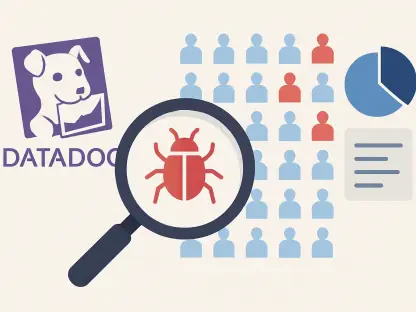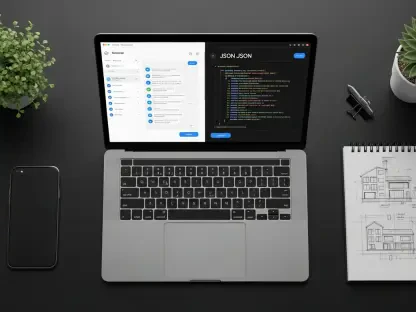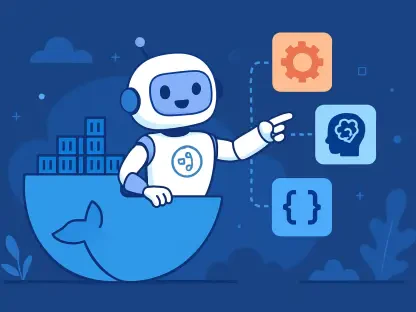In the high-stakes world of software development, where deadlines loom large and code quality can make or break a project, engineers often find themselves mired in repetitive tasks and inconsistent practices that drain time and energy. Picture a scenario where the mundane burden of writing boilerplate code for unit tests or API endpoints is lifted, freeing up mental space for tackling intricate challenges, or where every developer on a team effortlessly aligns with the same high standards without constant oversight. This isn’t just a pipe dream—it’s a reality made possible by integrating structured templates with GitHub Copilot, an AI-driven code completion tool. By pairing Copilot with thoughtfully designed templates, developers can elevate it from a basic autocomplete helper to a dynamic engine for productivity and uniformity. This transformative approach addresses core pain points in engineering workflows, promising not just faster output but also smarter, more consistent results across diverse projects and teams.
Unlocking Efficiency with Structured Guidance
Copilot templates serve as a critical blueprint that shapes the AI tool’s output, ensuring it aligns with specific patterns and organizational standards. Instead of delivering generic or off-target suggestions, Copilot, when guided by templates, produces code snippets tailored to repetitive tasks like drafting unit tests, structuring API endpoints, or embedding documentation. This addresses a pervasive challenge in software engineering: the sheer volume of time spent on repetitive coding patterns. For instance, crafting similar error-handling blocks or test structures for every new feature can become a tedious slog. Templates transform this by automating the process, enabling Copilot to replicate established formats with minimal input. The result is a significant reduction in manual effort, allowing engineers to redirect their focus toward solving complex, high-value problems rather than getting bogged down in routine grunt work. This streamlined approach doesn’t just save time—it redefines how developers interact with AI tools in their daily grind.
Moreover, the efficiency gained from templates extends beyond individual tasks to reshape entire project timelines. When Copilot is fed clear, structured input, it consistently generates relevant code that adheres to predefined norms, minimizing the need for extensive revisions or debugging. Consider a scenario where a developer sets up a template for API response handling—once established, Copilot can replicate this across multiple endpoints, ensuring uniformity without repeated manual coding. This capability is especially impactful in large-scale projects where repetitive elements are abundant, and every saved minute compounds into hours or even days over the course of development. By reducing cognitive load, templates empower engineers to maintain momentum on critical aspects like innovative feature design or performance optimization, ultimately accelerating delivery without compromising on the integrity of the codebase. The ripple effect of such efficiency is a workflow that feels less like a chore and more like a well-oiled machine.
Fostering Team-Wide Uniformity
One of the most compelling advantages of integrating templates with Copilot lies in their ability to enforce consistency across collaborative development environments. In teams where multiple developers contribute to a single codebase, variations in coding style or structure can lead to confusion, bugs, and maintenance headaches. Templates act as a unifying force, ensuring that every contributor—whether a veteran or a recent addition—follows identical conventions. For example, a standardized template for API handlers can guarantee that all endpoints include consistent input validation and error responses, regardless of who writes the code. This uniformity enhances readability, making it easier for team members to understand and debug each other’s work. It also reduces the friction of code reviews, as deviations from established norms become far less frequent, streamlining collaboration in dynamic, multi-developer settings.
Beyond improving readability, consistent templates contribute to long-term maintainability and scalability of software projects. A codebase built on uniform patterns is inherently easier to update or expand, as new features can slot into existing structures without clashing with disparate styles. This is particularly valuable in environments where projects grow over time or where teams rotate members frequently. When Copilot generates code based on shared templates, it minimizes the risk of introducing inconsistencies that could snowball into technical debt. Additionally, this approach fosters a sense of shared ownership among developers, as everyone operates from the same foundational playbook. The outcome is a cohesive codebase that withstands the pressures of rapid iteration and team turnover, ensuring that quality remains a constant even as the scope or personnel evolves. Such alignment is a cornerstone of successful, sustainable software engineering.
Streamlining Onboarding for New Talent
Bringing new developers up to speed in a fast-moving project can often be a slow and resource-intensive process, but Copilot templates offer a powerful solution to ease this transition. By providing clear, reusable code patterns, templates significantly reduce the learning curve for newcomers, enabling them to grasp project-specific conventions without wading through extensive documentation or trial-and-error coding. Instead of struggling to match an unfamiliar style or decipher unique workflows, new team members can rely on templated structures to guide their contributions from the outset. This is especially beneficial in high-pressure environments where rapid integration is essential to meeting tight deadlines. The immediate ability to produce work that aligns with team standards boosts confidence and productivity, allowing fresh talent to make meaningful impacts right away.
Furthermore, the onboarding advantage of templates extends to knowledge transfer within teams, creating a more resilient workforce. When standardized patterns are embedded in Copilot’s suggestions, they serve as an implicit training tool, subtly reinforcing best practices with every line of code generated. This reduces the dependency on senior developers for constant guidance, as the templates themselves act as a reference point for expected output. Over time, this builds a culture of self-sufficiency, where even less experienced engineers can navigate complex projects with minimal supervision. The long-term benefit is a team that adapts quickly to new hires or shifting roles, maintaining momentum without sacrificing quality. By lowering entry barriers, templates ensure that onboarding becomes less of a bottleneck and more of a seamless step in scaling development efforts, keeping projects on track regardless of staffing changes.
Instilling Quality Through Best Practices
Templates paired with Copilot go beyond mere time savings to actively promote high-quality coding standards by embedding best practices into the AI’s output. Well-crafted templates can incorporate essential elements like robust error handling, comprehensive input validation, and detailed logging, ensuring that every suggestion from Copilot reflects industry-standard approaches. This proactive strategy counters the risk of propagating suboptimal habits, as the AI tool amplifies the input it receives—quality templates yield quality code. For developers, this means less time spent correcting sloppy output or retrofitting essential safeguards, as the groundwork for excellence is laid from the start. Such an approach is invaluable in maintaining a codebase that not only functions well but also adheres to rigorous standards of reliability and security.
Additionally, the focus on best practices through templates cultivates a disciplined development environment where quality is non-negotiable. By consistently guiding Copilot to suggest code that prioritizes correctness over speed, templates help prevent the accumulation of technical debt that often plagues rushed projects. This is particularly critical in domains where errors can have significant consequences, such as financial or healthcare applications. Developers benefit from a reduced mental burden, knowing that the foundational elements of their code are sound, allowing them to concentrate on higher-level design or innovation. Over time, this builds trust in the AI tool as a reliable partner rather than a shortcut prone to mistakes. The emphasis on quality transforms workflows into a cycle of continuous improvement, where each templated suggestion reinforces a commitment to excellence across every layer of the software being built.
Real-World Impact in Daily Development
The practical value of Copilot templates becomes strikingly evident when applied to routine engineering tasks, demonstrating tangible improvements in efficiency and output. Take test generation with frameworks like Jest—once a template for a test case is set, Copilot can suggest additional scenarios, including edge cases, based on minimal prompts like structured comments. Similarly, in API development using Express.js, templates ensure that endpoints maintain a uniform structure for input handling and error management, streamlining both creation and maintenance. Even documentation benefits, as JSDoc or docstring templates guide Copilot to produce meaningful descriptions that clarify function intent. These real-world applications highlight how templates equip Copilot with the context needed to deliver precise, relevant code, slashing the time spent on repetitive chores while upholding a high bar for consistency.
Equally important is how these practical applications translate into measurable gains across project lifecycles. Tasks that once consumed significant chunks of a developer’s day—such as manually crafting multiple test cases or scaffolding repetitive API logic—can be condensed into minutes with the right templates. This efficiency compounds in larger projects, where repetitive elements multiply, allowing teams to allocate more resources to creative problem-solving or performance tuning. Beyond speed, the predictability of templated output simplifies debugging and collaboration, as developers can anticipate the structure of generated code. The impact is a workflow that feels less fragmented and more cohesive, with Copilot acting as a reliable assistant tailored to specific needs. By grounding abstract benefits in concrete use cases, templates prove their worth as a cornerstone of modern software development, driving both immediate results and long-term scalability.
Reflecting on Transformative Outcomes
Looking back, the integration of Copilot templates into engineering workflows marked a pivotal shift in how software development tackled inefficiency and inconsistency. These templates reshaped repetitive tasks into automated processes, ensuring that time once lost to boilerplate coding was redirected toward innovation. They also cemented uniformity across teams, smoothed onboarding challenges, and embedded quality into every line of code generated. As a next step, developers were encouraged to start small by crafting a handful of reusable templates for common tasks, then scale adoption through team collaboration. Iterating on these templates over time, refining them based on project needs, proved essential for sustained impact. Additionally, maintaining human oversight to validate Copilot’s suggestions ensured that speed never trumped accuracy. This strategic blend of AI assistance and structured guidance laid a foundation for workflows that were not only faster but fundamentally smarter, paving the way for future advancements in development practices.









